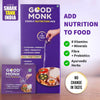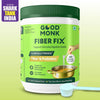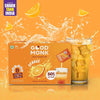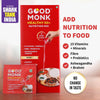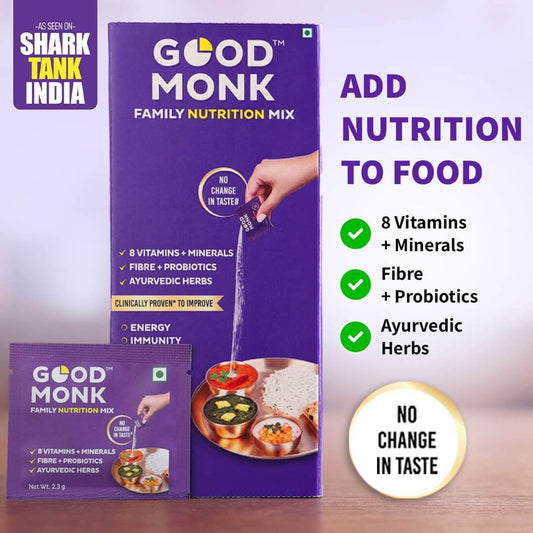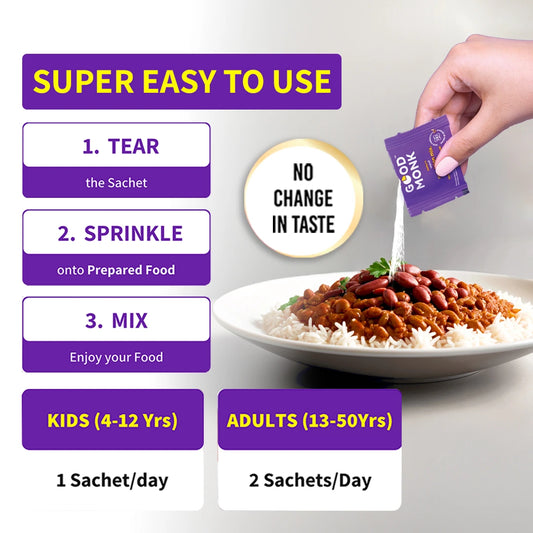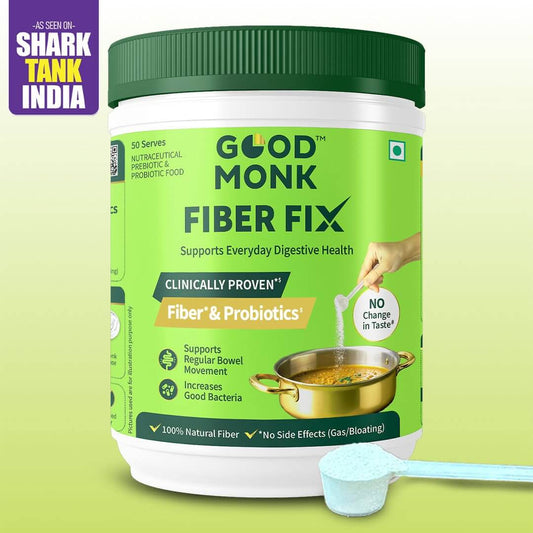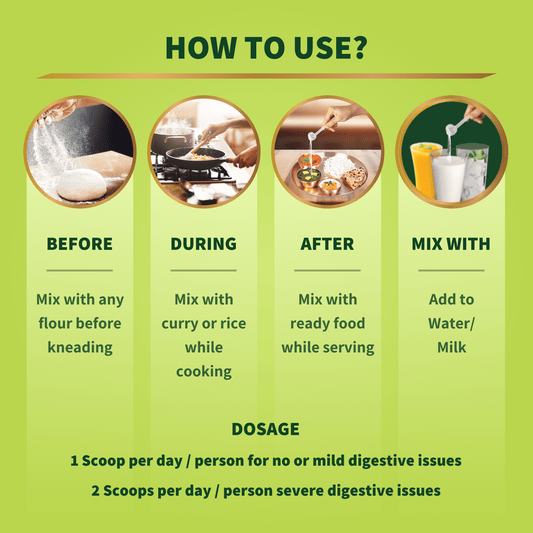Key Takeaways
- Prioritise protein, calcium, vitamin D, and B12 to maintain strength, bone health, and cognitive function after 50.
- Support gut and immunity with fiber and probiotics while staying hydrated and limiting processed foods.
- Adopt a balanced, consistent diet or supplements to fill nutritional gaps and promote active, healthy aging.
In This Article
Protein: More Than Just Muscle
B12 and Folate: Vital for Mind and Mood
Fiber and Probiotics: For Gut and Immunity
Antioxidants and Omega-3s: Slow the Clock Naturally
Water and Electrolytes: Stay Hydrated, Stay Sharp
Mindful Eating and Balanced Portions
The Good Monk Way: Nutrition That Supports You After 50
Introduction
Aging is inevitable - but decline doesn’t have to be.
Take charge of your health and healthy aging nutrition needs early on!
Why is it important for you to start taking care of your health earlier?
After the age of 50, your body starts going through a quiet but steady transformation. Hormones shift, muscle mass gradually declines, digestion slows down, gut microbiome and nutrient absorption weakens12. It’s no longer just about eating right - it’s about old age food and nutrition choices to support energy, immunity, bone strength, and mental well-being.
Know about the physiological and functional changes in the aging adult:
The hallmarks of aging are reflected in every aging cell in the body, leading to gradual changes across various organs and systems. The image below illustrates how these changes impact key biological systems, including the digestive, immune, musculoskeletal, nervous, and cardiovascular systems, along with the microbiome.

FIGURE 1: The aging journey: The changes in health conditions with aging [being optimal (green line) or suboptimal (orange line)] are related to changes in key physiological functions and can be prevented with diet, sleep and physical activity. (Image Source: Kassis et al, 2023).
Learn about how small changes in daily nutrition habits can add quality life to years:
If you’re over 50, or caring for someone who is, here’s what your body really needs in terms of healthy aging nutrition - and how small, mindful changes in old age food and nutrition and the choice of best nutritional supplements for seniors can add quality life to your years.
1. Protein: More Than Just Muscle
From the age of 50, we lose up to 1% of muscle mass per year - a condition known as sarcopenia3. This not only affects strength but also balance, mobility, and metabolic health. Getting enough protein for seniors is key to prevent sarcopenia and keep metabolism active.
What You Need:
- 0.8-1.0 g of protein/kg body weight/day4
- Sources: protein rich foods to eat after 50 are Lentils, dairy, eggs, fish, soy, sprouts, nuts and seeds
Tip: Add a protein source at every meal, especially breakfast. This is very important for putting together a healthy diet for seniors.
What to Watch / Avoid:
- Skipping meals or relying on tea & bread toast culture
- Too little protein leading to tiredness, slow recovery, and weaker bones
2. Calcium and Vitamin D: Protecting Your Frame
Bones naturally become thinner and more brittle with age. Postmenopausal women lose bone faster due to a drop in estrogen, increasing the risk of osteoporosis and fractures5,6. Strong bones are a result of a consistent healthy diet for seniors rich in calcium and vitamin D.
What You Need:
- Calcium: 1000-1200 mg/day
- Vitamin D: 600-800 IU/day (check blood levels)7
- Sources: Milk, yogurt, ragi, tofu, leafy greens, fortified foods
- Spend 15-20 mins in morning sunlight daily
What to Watch / Avoid:
- Avoiding dairy entirely without alternatives
- Ignoring supplements when dietary intake is insufficient
3. B12 and Folate: Vital for Mind and Mood
Vitamin B12 absorption declines in old age food and nutrition due to reduced stomach acid production8. Low levels are associated with cognitive decline, memory loss, and depression9. If dietary intake is low, consider the best nutritional supplements for seniors to support brain and nerve health.
What You Need:
- B12-rich foods: Eggs, dairy, fish, fortified cereals
- For vegetarians/vegans: Consider Good Monk Healthy 50+ Nutrition Mix
- Folate works with B12 for heart and brain health
What to Watch:
- Subtle signs like tingling, fatigue, or forgetfulness
4. Fiber and Probiotics: For Gut and Immunity
About 70% of immune cells reside in your gut10. After 50, digestive enzyme activity decreases, and gut motility slows, leading to bloating, indigestion, and irregular bowels11 , making probiotics for seniors vital for gut health and immunity.
What You Need:
- Fiber: 25-30 g/day from fruits, vegetables, millets, legumes
- Probiotics for seniors: Curd, buttermilk, fermented foods, or supplements
What to Watch / Avoid:
- Low fiber diets, cause constipation, poor nutrient absorption
5. Antioxidants and Omega-3s: Slow the Clock Naturally
Free radicals accelerate aging. Antioxidants and omega-3s are pillars of healthy aging nutrition, fighting oxidative stress, supporting skin health, memory, and heart function12.
What You Need:
- Vitamins A, C, E, Zinc, Selenium
- Sources: Bright-coloured vegetables, berries, nuts, green tea
- Omega-3s from flaxseeds, walnuts, fatty fish
6. Water and Electrolytes: Stay Hydrated, Stay Sharp
Hydration is an often overlooked aspect of nutrition in old age. With age, thirst sensation diminishes, increasing risk of dehydration, which can cause fatigue and confusion13. As a part of healthy aging nutrition, keeping yourself hydrated is a must!
What You Need:
- 6 - 8 glasses of water/day
- Include water-rich foods: fruits, cucumbers, soups, herbal teas
- Add natural electrolytes if sweating or fatigued
7. Mindful Eating and Balanced Portions
Older adults often overeat or undereat due to appetite changes, emotional eating, or reduced mobility. Here are practical ways to plan old age food and nutrition.
What You Can Do:
- Plate method for old age food and nutrition: Half veggies, one-quarter protein, one-quarter carbs
- Limit processed foods, sugars, and salt
- Small, frequent meals if digestion is slow
- Avoid deep-fried or oily foods
The Good Monk Way: Nutrition That Supports You After 50
At Good Monk, we believe that nutrition after 50 doesn’t have to be complicated — it just needs to be consistent and complete.
Our Healthy 50+ Nutrition Mix is specially designed to bridge daily nutritional gaps with:
- 15+ essential micronutrients (Vitamins A, B1, B3, B6, B9, B12, C, D, E, K, Iron, Zinc, Biotin, Selenium, Chromium)
- Lysine (protein building block)
- Clinically Proven Probiotics, Fiber, Ashwagandha & Brahmi
- Energy, Bone and Gut Health supporting nutrients
- Easy to add to your daily meal - No pills, no hassle
Because healthy aging isn’t just about living longer - it’s about living stronger, active, and more joyful.
Turning 50 is not the beginning of decline - it’s the start of conscious living.
With the right nutrition, you can stay active, independent, and vibrant well into your 60s, 70s, and beyond.
Fuel your second innings with what your body truly needs. Let every meal be an investment in your energy, strength, smile, and spirit.
References:
- WHO. (2015). World Report on Ageing and Health.
- O'Toole, P. W., & Jeffery, I. B. (2015). Gut microbiota and aging. Science, 350(6265), 1214-1215.
- Cruz-Jentoft AJ, et al. (2010). Sarcopenia: European consensus on definition and diagnosis. Age and Ageing, 39(4), 412-423.
- Bauer J, et al. (2013). Evidence-based recommendations for optimal dietary protein intake in older people. J Am Med Dir Assoc, 14(8), 542–559.
- National Institutes of Health. (2022). Osteoporosis and Bone Physiology.
- Looker AC, et al. (2012). Prevalence of low femoral bone density in older adults. Osteoporosis International.
- Holick MF. (2007). Vitamin D deficiency. N Engl J Med, 357(3), 266–281.
- Allen LH. (2009). How common is vitamin B-12 deficiency? Am J Clin Nutr, 89(2), 693S–696S.
- Moore E, et al. (2012). Cognitive impairment and vitamin B12: a review. International Psychogeriatrics, 24(4), 541-556.
- Round JL, & Mazmanian SK. (2009). The gut microbiota shapes intestinal immune responses during health and disease. Nat Rev Immunol, 9(5), 313-323.
- Tran L, Greenwood-Van Meerveld B. (2013). Age-associated remodeling of the intestinal epithelial barrier. J Gerontol A Biol Sci Med Sci, 68(9), 1045–1056.
- Joseph JA, et al. (2005). Reversing the deleterious effects of aging on neuronal communication and behavior. Neurobiology of Aging, 26(5), 719–726.
- Kenney WL, & Chiu P. (2001). Influence of age on thirst and fluid intake. Medicine & Science in Sports & Exercise, 33(9), 1524–1532.
- Kassis et al. (2023). Nutritional and lifestyle management of the aging journey: A narrative review. https://doi.org/10.3389/fnut.2022.1087505
FAQs on Nutrition in Old Age
1. What is the best source of protein for seniors?
The best sources of protein for seniors come from a mix of plant and animal sources. Some of the best protein-rich foods to eat after 50 are: Lentils, soy, nuggets, dairy, and fish are excellent. You can also add a protein supplement or a perfect nutrition supplement to help fill gaps in senior nutrition.
2. How much water should a 60-year-old drink daily?
Older adults should aim to drink 6-8 glasses daily. As thirst sensitivity declines with age, seniors need to make a conscious effort to take care of their hydration. In fact, water-rich foods like fruits and soups can also help. Furthermore, adding vitamin and mineral rich juice powders or a simple orange drink to your diet can also support hydration. Adding vitamins and minerals to your hydration goals is one of the best ways to prepare a healthy drink for seniors.
3. How to improve digestion after 50 naturally?
For better digestion, seniors can;
- Increase their fiber intake
- Include probiotics for seniors, like curd and fermented foods, in their diet
- Stay hydrated
- Limit the consumption of refined carbs and fried food
- Fiber powder can be a smart addition to your diet.
4. Do seniors need supplements if they eat healthy?
Even with a balanced diet, nutrient absorption reduces with age. Therefore, choosing the best nutritional supplements for seniors is going to ensure an adequate intake of B12, vitamin D, calcium, probiotics, etc.
5. Which snacks are good for elderly people?
Some good snack options to replenish nutrition in old age include roasted channa, fruit with yogurt, vegetables, soups, sprout chaat, etc. Having said that, make sure that you avoid processed, excessively salty, or sugary snacks.
6. How to maintain muscle mass after 50?
To navigate the condition of sarcopenia, it is advisable that senior nutrition should include enough protein at every meal. In addition to that, you can engage in resistance or strength training 2-3 times a week under expert supervision. Also, make sure that you are taking adequate vitamin D and calcium for bone support.
7. What are the signs of vitamin deficiency in seniors?
Common symptoms of vitamin deficiency in nutrition for seniors include fatigue, memory lapses, and tingling in hands or feet. B12, vitamin D, and iron deficiencies are very common in seniors. You can talk to your doctor and get blood tests done to confirm the extent of these deficiencies.
Related articles:
About the author:
This blog was written by Isha Singh, Head Nutrition - Product Innovation, Comms and Clinicals at Good Monk- a clean and honest nutrition brand supported by doctors and food scientists. Every product is backed thorough clinical evidence and clinically proven ingredients and made to help families eat better, feel better, and live healthier every day.
Disclaimer: The content of this blog reflects the author’s summary and interpretation of the topic. It is intended for informational purposes only and should not be considered a substitute for professional advice. The views expressed are not personal opinions but are based on existing research or expert insights where referenced.
Popular Searches
Dietary Supplement | Best Multivitamin For Adults | Pineapple Powder | Fiber Supplements India | Orange Powder | Milk Powder For Kids | Instant Drink Mix | Immunity Booster | Health Powder for Adults
